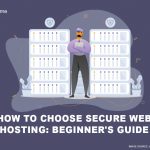By now, you know how important having a website is. After all, that’s why you are now looking for the best resources and web hosting plans to make it a success. However, all hosting plans offer different amounts of resources. Figuring out which web hosting plan to choose can be quite daunting when you are just getting started online. How do you know which hosting package is right for your specific website’s needs? What aspects of hosting are most important to help you run an efficient and successful website? You’ll also find yourself asking questions like how much RAM do I need or how much bandwidth is enough.
If you are at this green stage in your web hosting journey and need help in determining how to choose the right resources for your web hosting plan, this article will help.
Table of Contents
Things To Know Before Choosing Resources
You have made the wise decision to obtain online real estate by purchasing a domain for your website and now it is time to put up your ‘sold’ sign. However, it is essential to know what kind of website you want to run. This will help you to determine how to choose resources you will require to run a successful website. Start by answering the following questions:
- What type of website are you creating? Will you be using WordPress or will you be building a static HTML website?
- How many sites will you be building? Some hosts make it possible to create multiple sites using the same account.
- How much monthly traffic do you expect to experience? Be very realistic. Knowing the amount of traffic your website(s) will get can help to determine how much resources you need. In addition, you will require a hosting plan that’s scalable if your plan has to traffic heavy sites over time.
- Will you need extra features, such as email hosting or an SSL certificate? Make sure your web host offers what you’re looking for.
If you have answered those questions realistically, you are now ready to choose the necessary amount of resources needed to power your website. These resources are as follows.
How Much RAM Do You Really Need?
Random Access Memory, RAM for short is simply the short-term data storage within a computer, which is accessed directly by the central processing unit (CPU). How does that relate to your website and hosting? Well, RAM is the memory that stores all your temporary data when your site is running multiple processes at the same time, like when your scripts have to execute a task. The more processes your site runs, the more RAM it will require.
If your website doesn’t have enough RAM, it will not be able to load all your scripts and carry out various processing. This will result in your users receiving a ‘500 internal server error’ message. This is not good for business and can damage your conversion rates and your company’s reputation.
If you run a small website, such as a blog or e-commerce site, the usual amount of RAM that comes with most hosting packages will suffice. However, more RAM allocation is needed for higher traffic sites.
When Do You Need More RAM?
- Websites that get a large amount of traffic need more RAM to keep up with server request.
- If you use Content Management Systems (CMS) such as WordPress, Drupal, and Joomla
- Dynamic sites need more RAM than static websites
How Much CPU Do You Need?
As mentioned above, a CPU is a central processing unit. It processes instructions, runs operating systems and applications, receives input, processes them and provides output. Your website server has several CPUs and its capacity determines how much information it can store and process. Large CPUs have the ability to process and store more information. Therefore, the amount of space you have on your CPU will help to determine your site’s performance.
When you choose a shared hosting plan, the resources on the CPU are divided among your site and all the other websites on the server. Though CPUs can process multiple requests coming in at the same time, when this happens in large volumes it can cause CPU overload. This will slow down your site and affect its overall performance.
When Do You Need More CPU?
- If you have large, higher traffic sites. A shared hosting environment isn’t for websites that require more CPU. Instead, for hosting plans with larger CPU capacity, choose VPS or dedicated hosting.
How Much Bandwidth Do You Need?
Website hosting bandwidth has to do with the data transfer rate between a website and computers connected to it within a specific time. Usually, you measure bandwidth in seconds and it’s calculated on a monthly basis.
Admittedly, figuring out how much bandwidth you need for your website can take a bit of trial and error.
How to calculate your estimated bandwidth is easy:
1. First, using kilobytes (KB), estimate the average page size of your site.
2. Then multiply this value by the average number of visitors you get monthly.
3. Finally, multiply the result from step 2 by the average number of page views per visitor.
These simple calculations should be able to give you a good estimate of how much bandwidth you need for your website. Many web service providers offer unlimited bandwidth options.
Who Needs More Bandwidth?
1. Large, dynamic sites will require a lot of bandwidth.
2. Higher traffic websites
How Much Local storage/Disk Space Do You Need?

Disk space refers to the amount of space your web host service provider allocates for the storage of your website and the files that make it up. The amount of disc space you require is dependent on the content you’ll put on your website. Will it have a lot of graphics, videos and/or photos? Are you going to make it database-driven, or have downloadable software?
All these things influence the amount of storage you will need. The more dynamic your website the more storage you will require. Many sites have an average of about 150 MB with a single web page taking up approximately 1-2 MB. You should try to ensure that each page doesn’t take up more than 2 MB. That’s because it will increase the loading time, resulting in bad user experience. Several Web hosting providers offer unlimited disc space.
Ensure that the hosting plan that you choose gives you the ability to increase space should the need arise.
Who needs more disc Space?
1. Dynamic blogs and personal websites that consist of images files, video and files audio along with the scripts in the programming language.
2. Popular high-quality websites that are updated often with new content and resources.
3. Video, Music and gaming websites have huge disc space requirements.
4. News and digital publications, which consist of posts, photos and videos, but on a much grander scale.
Conclusion
Your website will require more resources the more popular it becomes. These added resources will allow your website to load fast thus boosting the user experience of visitors.
Different hosting environments offer different resource allocation. Shared hosting offers the smallest allocation. While VPS hosting is more flexible providing more server resources like Hard drive space, RAM, CPU and Bandwidth. This allows greater scalability. Dedicated server hosting provides even higher resource allocation than VPS. It also allows you to scale up or expand as much as you needed. Cloud hosting options use virtual technology to offer big data storage and resources.
However, as mentioned above, you should choose your resources based on the content and features of your website. One of the overarching goals is the data transfer speed between your website and visitors. Choose the hosting package that offers the resources suited to you on Monsterhost, focus on areas such as scalability, performance, speed, and storage.






